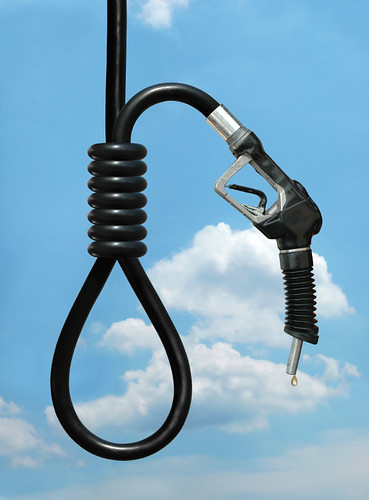Climate bill takes aim at transportation emissions on land and at sea
(Source: New York Times- Greenwire; Image: Steve Edwards @Flickr)
Roughly one-third of the nation’s total greenhouse gas emissions are from the transportation sector, according to government estimates, and several key lawmakers have said that no climate and energy measure can be complete without addressing transportation.
Sweeping climate and energy legislation that Democratic leaders of the House Energy and Commerce Committee unveiled yesterday takes direct aim at greenhouse gas emissions from vehicles across the transportation spectrum, from passenger cars to oceangoing ships.
 The bill from Reps. Henry Waxman (D-Calif.) and Ed Markey (D-Mass.) would create a suite of federal emissions standards for cars and light trucks, as well as trains, heavy-duty trucks, and ships. It also seeks to curb emissions by pushing the development of plug-in electric vehicles and infrastructure and by setting a “low-carbon fuel standard” for the transportation sector.
The bill from Reps. Henry Waxman (D-Calif.) and Ed Markey (D-Mass.) would create a suite of federal emissions standards for cars and light trucks, as well as trains, heavy-duty trucks, and ships. It also seeks to curb emissions by pushing the development of plug-in electric vehicles and infrastructure and by setting a “low-carbon fuel standard” for the transportation sector.
Roughly one-third of the nation’s total greenhouse gas emissions are from the transportation sector, according to government estimates, and several key lawmakers have said that no climate and energy measure can be complete without addressing transportation.
One of the bill’s provisions would require the president to “harmonize” federal auto fuel economy standards with any future emissions levels set by U.S. EPA and the strict emissions standards that California is hoping to enforce later this year, if it receives the waiver it needs to do so.
Earlier this year, the White House signaled that it was considering a similar move that would blend new corporate average fuel economy, or CAFE, standards with the auto emissions standards California is fighting to enforce. Under the federal Clean Air Act, California is the only state that can enforce its own standards — but only with an EPA waiver. If California receives the waiver, other states would be permitted to enforce the same tailpipe standard. Thirteen other states and the District of Columbia have already moved to adopt the stricter standards, and a handful of others have indicated they will follow if the waiver is granted.
The Waxman-Markey bill also pushes for greater use of plug-in electric cars and trucks, which are seen as a promising way to curb emissions and displace oil consumption by using electricity in the transportation sector.
The bill calls for states and utilities to develop plans to support the use of plug-in hybrid electric vehicles and all-electric plug-ins and for the Energy Department to launch a large-scale electric demonstration program. The state plans would determine how utilities would accommodate large fleets of plug-ins and would consider a host of charging options — including public charging stations, on-street charging, and battery swapping stations — and establish any necessary standards for integrating plug-ins into an electrical distribution system, including Smart Grid technology.
Click here to read the entire article.




 The low-carbon fuel standard, if approved next month by the state’s
The low-carbon fuel standard, if approved next month by the state’s